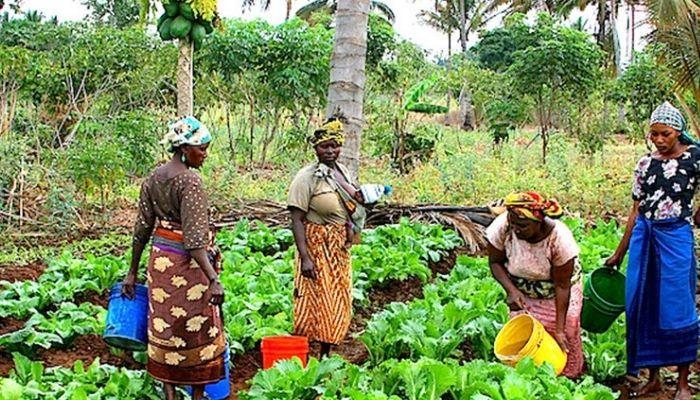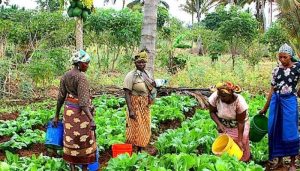
FOOD PRODUCTION CRISIS: WE’RE RAPED, KILLED – WOMEN FARMERS CRY OUT TO FG, STATES

Women farmers under the auspices of Small-Scale Women Farmers Organisation in Nigeria, SWOFON, Thursday, cried out to the Federal and State Governments over rape, kidnaps, killings, and fear to access farms due to attacks by terrorist groups.
Speaking at the end of a three-day ‘Training of Smallholder Women Farmers on Policy Influencing and Innovation’ with support from GIZ Global Programme AgSys Nigeria, ActionAid Nigeria (AAN), ActionAid International, and African Women in Agricultural Research and Development (AWARD), which organised it, the National President, SWOFON, Fatima Gunmi, made the call for adequate protection of women farmers as part of their recommendations in a communique issued at the end of the training.
Gunmi said women farmers are the nation’s food production powerhouse over the years, and have continued to produce food amid the horrifying terror that has been unleashed on farmers by terrorist groups.
The Inclusive Food Systems Project, IFSP, funded by GIZ Global Programme AgSys Nigeria implemented by ActionAid Nigeria aims to ensure that Nigeria’s food systems inclusively benefit women, young people, and other vulnerable groups, thereby driving sustainable agricultural transformation and economic growth.
The project focuses on building the capacities of smallholder women farmers and young people to actively participate in agricultural policy and program decision-making processes.
A total number of 91 participants attended the 3 three days training on Policy Influencing and Innovation.
The participants who are State Coordinators and other representatives were drawn from across the 36 States of the federation including the Federal Capital Territory.
The training organised built the capacity of smallholder women farmers on policy influencing and innovative engagement strategies while this Smallholder Women Farmers Stakeholders Interactive Forum on Inclusive Food Systems in Nigeria provides us an avenue to interact with policy makers, key stakeholders and donors in the agriculture sector on our participation and involvement as smallholder women farmers in Agriculture policies and programmes, and to advocate for the implementation of agricultural policies and programmes that promote inclusive food systems transformation in Nigeria.
She said: “We call on Federal and State Executives, National and State Houses of Assembly to scale up public investment in agriculture, and ensure timely consideration, passage, and timely budget releases and utilization as a strategic approach to increase food production, reduce hunger and poverty and achieve the National Agricultural Transformation and Innovation Policy, NATIP, objectives and Maputo/Malabo Commitments.
“Parliamentarians should ensure that their proposed zonal intervention (constituency) projects are agricultural and evidence-based to create meaningful impact in the communities.
“As approved by the 44th National Council on Agriculture and Rural Development (NCARD); the three tiers of government should commit 10% of their annual budget to the agriculture sector to meet the 10 per cent Maputo/Malabo Declaration required to support at least six per cent growth rate for the sector as postulated in the CAADP framework.
“There should be political will to allocate at least 10 per cent of annual budgets to the agriculture sector with appropriate budget lines so that Nigeria will be on track in the next Biennial Reporting to the African Union Heads of States and Government in line with the Malabo Declaration and Commitments of 2014.
“The 2025 and subsequent years Federal and States agriculture budget should be gender sensitive and responsive by providing line items for the implementation of the National Gender Policy in Agriculture that addresses specific challenges that affect women farmers different from men as well as avoid lumping up budget for women farmers and other groups such as youths.
“Situational analysis of Gender Based Violence (GBV) in agriculture evidenced the existence of different types of GBV in Nigeria’s agriculture. Federal and State Ministries of Agriculture should quickly strengthen community and institutions mechanisms to prevent and respond to Gender Based Violence within our food systems.
“Considering the agricultural risk; rising insecurity in farms; farm raiding, cattle rustling, and kidnapping, climate change and other natural disasters, farmers are not encouraged to continue farm practices without risk covers.
“Hence, both Federal and state governments should promote early warning system and the easy enrolment of agricultural insurance policies for smallholder farmers.”
Meanwhile, they called for commitment from the Federal Ministry of Agriculture and Food Security and State Ministries of Agriculture to ensure adequate access to credit for smallholder women farmers; National Agricultural Development Fund (NADF) should create a special credit scheme for smallholder farmers; The NADF should support small modular cottage processing and storage facilities in communities; The National Agricultural Growth Scheme and Agro Pocket (NAGSAP) should be well funded and executed to address the inputs gaps.
